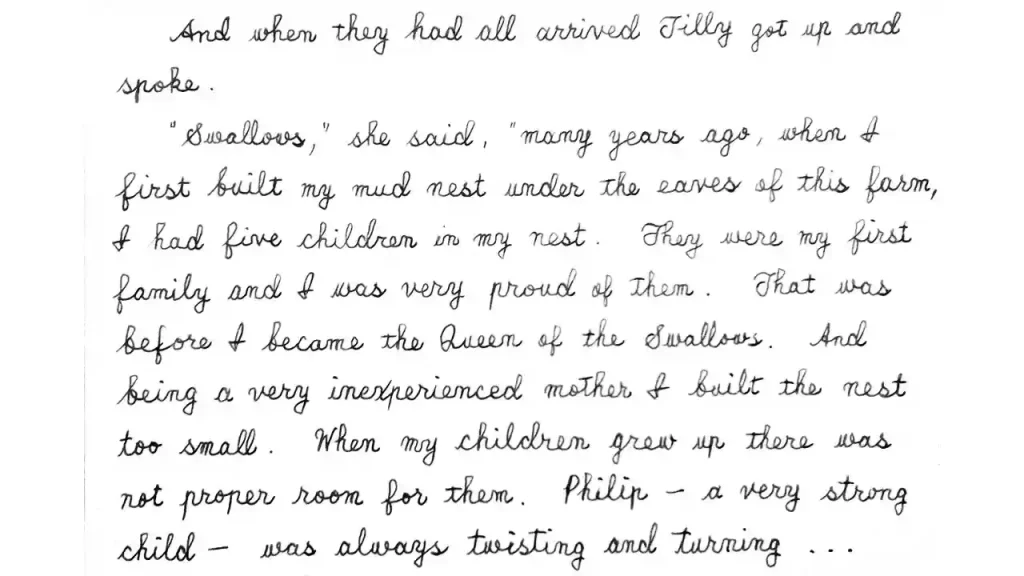And when they had all arrived Tilly got up and spoke.
The Story of Mrs. Tubbs
- subject: ティリー
- predicate: しゃべる
日本語訳:
ツバメたちが到着した後、ティリーは立ち上がり、しゃべりました。
- 到着 / tōchaku(とうちゃく,arrival)
“Swallows,” she said, “many years ago, when I first built my mud nest under the eaves of this farm, I had five children in my nest.
- subject: わたし
- predicate: こどもがいる
「ツバメたちよ、数年前に、私が初めてこの農場の軒下に泥の巣を作ったとき、巣には5匹の子供たちがいた」ティリーが言いました。
- 軒下 / nokishita(のきした,under the eaves)
- 泥 / doro(どろ,mud)
- 巣 / su(す,nest)
They were my first family and I was very proud of them.
- subject: そのこたち
- predicate: わたしのかぞく
「その子たちは私の初めての家族で、私はとても嬉しかったんだ」
- 家族 / kazoku(かぞく,family)
- 嬉しい / ureshii(うれしい,happy)
That was before I became the Queen of the Swallows.
- predicate: じょうおうになるまえ
「それは私がツバメの女王になる前の事だ」
- 女王 / joō(じょうおう,queen)
And being a very inexperienced mother I built the nest too small.
- subject: すは
- predicate: ちいさすぎる
「とても未熟な母親だったから、私が作った巣は小さすぎた」
- 未熟 / mijuku(みじゅく,immature)
- 母親 / hahaoya(ははおや,mother)
When my children grew up there was not proper room for them.
- subject: すのひろさ
- predicate: たりない
「子供たちが成長すると、巣の広さが足りなかった」
- 成長 / seichō(せいちょう,growth)
- 広さ / hirosa(ひろさ,extent)
- 不足 / fusoku(ふそく,shortage)
Philip—a very strong child—was always twisting and turning in the nest and one day he fell out.
- subject: フィリップ
- predicate: らっかする
「フィリップはとても力が強い子で、いつも巣の中で身体を動かしていた。そしてある日、彼は落下したんだ」
- 力 / chikara(ちから,power/strength)
- 強い / tsuyoi(つよい,strong)
- 身体 / karada(からだ,body)
- 落下 / rakka(らっか,fall)
He bumped his nose badly on the ground but it was not far to fall and he was not much hurt.
- subject: かれ
- predicate: けがしない
「地面に強く鼻をぶつけたけど、高さが無かったので彼は大した怪我はしなかったよ」
- 地面 / jimen(じめん,ground)
- 鼻 / hana(はな,nose)
- 怪我 / kega(けが,injury)
I was just going to fly down and try to pick him up when I saw a large weasel coming across the farm-yard to get him.
- subject: わたし
- predicate: きづく
- modifier: イタチに
「私はすぐに飛び降りて、彼を拾い上げようとした、その時、大イタチが農地を越えて、彼を捕まえに来ているのに気づいたんだ」
- 飛び降りる / tobioriru(とびおりる,jump down)
- 拾い上げる / hiroiageru(ひろいあげる,pick up)
My feathers stood up on the top of my head with fright.
- subject: かんう
- predicate: さかだつ
「恐怖で、私の冠羽が逆立った」
- 恐怖 / kyōfu(きょうふ,fear)
- 冠羽 / kan’u(かんう,crest/plume)
- 逆立つ / sakadatsu(さかだつ,stand on end)
I flew to the farm-house window and beat upon the glass with my wings.
- subject: わたし
- predicate: たたく
- modifier: ガラスを
「私は農場の窓へ飛んで、羽でガラスを叩いたんだ」
- 窓 / mado(まど,window)
- 叩く / tataku(たたく,strike/knock)
An old woman came out.
- subject: おばあさん
- predicate: でる
「おばあさんが出てきた」
When she saw Philip on the ground and the weasel coming to get him she threw her porridge-spoon at the weasel, picked Philip up and put him back in my nest.
- subject: おばあさん
- predicate: すにもどす
- modifier: かれを
「地面にいるフィリップと、彼を捕まえに来るイタチに気づいた時、おばあさんはイタチにスプーンを投げてフィリップを拾い上げて、私の巣に彼を戻してくれたんだ」
That old woman’s name was Mrs. Tubbs.
- subject: なまえ
- predicate: ミセス・タブス
「そのおばあさんの名前がミセス・タブスだよ」
She has now been turned out of her house and a very stupid red-faced man is living on the farm in her place.
- subject: かのじょ
- predicate: おいだされる
- modifier: いえを
「彼女は現在家を追い出されて、馬鹿な赤ら顔の男がその農場に住んでいる。彼女の代わりに」
We have got to do our best to turn him out and put Mrs. Tubbs back in her house, the same as she put my child back in his nest.
- subject: わたしたち
- predicate: もどす
- modifier: かのじょを
「私たちはベストを尽くして、そいつを追い出して、家にミセス・タブスを戻さないとならない。彼女が私の子供を巣に戻してくれたのと同じように」
So I have called you all together a week earlier than usual this year for our long journey to Africa, and before we leave England we have got to see what we can do.
- subject: わたし
- predicate: よびあつめる
「だから今年は、いつものアフリカへ向かう時期よりも一週間はやく、あなたたちを呼び集めた。イングランドを去る前に、自分たちに何ができるか検討しないといけないからね」
- 時期 / jiki(じき,period/time)
- 一週間 / isshūkan(いっしゅうかん,one week)
- 呼び集める / yobiatsumeru(よびあつめる,call together)
- 検討 / kentō(けんとう,consideration)
The first thing we’ll do is to stop up his chimney so his fire won’t burn.
- subject: わたしたち
- predicate: ふさぐ
- modifier: えんとつを
「まずは、煙突を塞ごう。火が燃えないように」
- 煙突 / entotsu(えんとつ,chimney)
- 塞ぐ / fusagu(ふさぐ,block/obstruct)
- 火 / hi(ひ,fire)
- 燃える / moeru(もえる,burn)
Then put mud all over the windows so the light will not come in.
- predicate: つける
- modifier: どろを
「そのあと、窓中に泥をつけよう。光が入らないように」
Bring all the straw from the barn and fill his bed-room with it.
- predicate: とる
- modifier: むぎを
「納屋から麦を全部取って、それで彼の寝室をいっぱいにしよう」
Take his best neck-tie and drop it in the river.
- predicate: おとす
- modifier: ネクタイを
「彼の一番のネクタイを取って、川に落とそう」
And do everything you can to drive him out.”
- predicate: おいだす
- modifier: かれを
「できる事は何でもやって、彼を追い出そう」
Reference : The Story of Mrs. Tubbs by Hugh Lofting(project gutenberg)
English Story With Easy Japanese Translation
